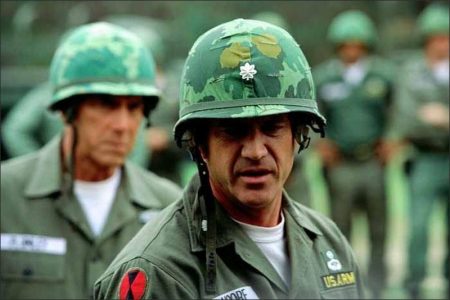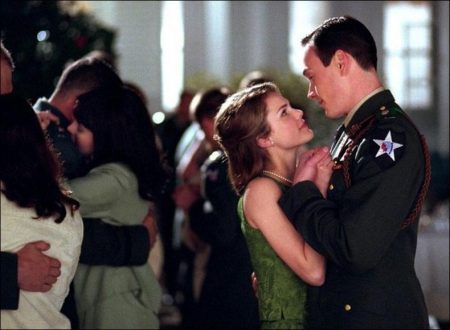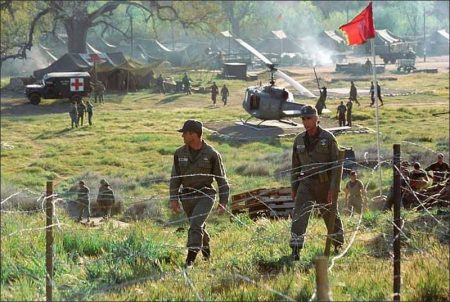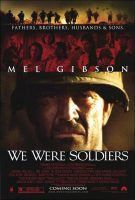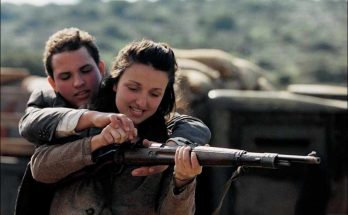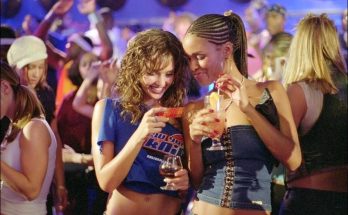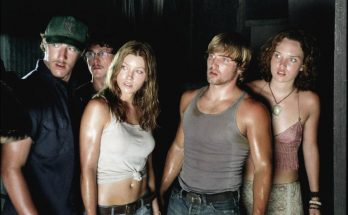We Were Soldiers movie storyline. Screenwriter Randall Wallace, a specialist in sweeping historical epics, steps behind the camera for this fact-based Vietnam War drama that reunites him with his Braveheart (1995) star Mel Gibson. Gibson is Lt. Col. Hal Moore, commander of the First Battalion, Seventh Cavalry, the same regiment fatefully led by George Armstrong Custer.
As part of the Pleiku Campaign of late 1965, Moore is assigned to an action at Landing Zone X-Ray in the Drang Valley, an area that would come to be known as the “The Valley of Death.” Moore soon finds himself and his men contained to an area about the size of a football field, surrounded by more than 2,000 enemy troops and engaged in the first major battle of the war.
Heroism becomes the order of the day as men like Moore, chopper pilot Bruce Crandall (Greg Kinnear), and Lt. Henry Herrick (Marc Blucas) refuse to yield, in spite of heavy losses of life. The film co-stars Madeleine Stowe, Chris Klein, Keri Russell, and Sam Elliott. We Were Soldiers is based on the book We Were Soldiers Once…and Young by Lt. Gen. Harold G. Moore (retired) and UPI reporter Joe Galloway (played in the film by Barry Pepper).
We Were Soldiers is a 2002 American war film that dramatizes the Battle of Ia Drang on November 14, 1965. The film was directed by Randall Wallace and stars Mel Gibson, Denzel Washington, Robert Duvall, James Woods, Anne Heche, Eddie Griffin, Kimberly Elise, Ray Liotta, Daniel E. Smith and Shawn Hatosy. It is based on the book We Were Soldiers Once… And Young (1992) by Lieutenant General (Ret.) Hal Moore and reporter Joseph L. Galloway, both of whom were at the battle.
Film Review for We Were Soldiers
Let’s go do what we came here to do!” Lieut. Col. Hal Moore (Mel Gibson) commands his troops in We Were Soldiers before plunging with them into one of the most savage battles of the Vietnam War. More than 200 of Moore’s 450 men died in that November 1965 Ia Drang Valley combat, surrounded by about 2,000 enemy troops, who also suffered heavy losses.
It was the first major encounter between American soldiers and those of the People’s Army of [North] Vietnam and, we now know, only a taste of the terrible war and national soul-searching to come. And when Moore — now 80-year-old Lieut. Gen. Harold G. Moore (Ret.) — told his story in the book ”We Were Soldiers Once…And Young,” cowritten by veteran journalist Joseph L. Galloway, who was with Moore in that Valley of Death, the authors stressed the bravery of soldiers on both sides, doing what they came to do.
Randall Wallace does what he comes here to do too: The writer-director bestows honor — generously, apolitically — not only on the dead and still living American veterans who fought in Ia Drang, but also on their families, on their Vietnamese adversaries, and on the families of their adversaries too. Rarely has a foe been portrayed with such measured respect for a separate reality, which should come as a relief to critics (I’m one) of the enemy’s facelessness in ”Black Hawk Down”; vignettes of gallantry among Vietnamese soldiers.
Such humanizing visual details as a Vietnamese sweetheart’s photograph left behind in no way interfere with the primary, rousing saga of a fine American leader who kept his promise to his men to ”leave no one behind dead or alive.” Nor do pauses for compassion slow down battle scenes captured by ”Dances With Wolves” cinematographer Dean Semler and ”Saving Private Ryan” production designer Tom Sanders with all the attention to the agony of burned and bloody flesh we’ve come to expect in a post-Ryan war pic.
On the other hand, such old-fashioned storytelling emphasis on virtue and bonding — both among brothers-in-arms as well as between soldiers and their families back home — too often becomes the filmmaker’s weakness, particularly when humans speak to one another in banner-headline sentences, rather than gesture in battlefield’s silent semaphore. It’s no coincidence that Wallace wrote the script for ”Braveheart,” that blue-faced, thunder-hooved Oscar-winning 1995 saga about a charismatic warrior-leader, which Gibson directed and in which he starred. Or that none of that movie’s five Academy Awards went to the screenplay.
”Tell my wife I love her,” ”I’m glad I could die for my country,” ”I know God has a plan for me,” and ”I’ll never forgive myself that my men died and I didn’t” are among the fortune-cookie proclamations uttered by the fighting men of ”We Were Soldiers.” (”Daddy, what is a war?” is the cringe-maker piped by one of Moore’s five little kids; ”Custer was a pussy — you ain’t,” is the headstone reject intoned by the officer’s second-in-command, a rawhide-tough coot played by Sam Elliott.)
The young actors who play Moore’s men are lithe and engaging. Greg Kinnear, as risk-taking helicopter pilot Maj. Bruce Crandall, does that thing he does better and better with each role he takes, siphoning humor into a serious situation. Barry Pepper, who expertly steers war correspondent Joe Galloway’s shifting course from battlefield observer to participant, is rapidly becoming the go-to guy for Gen-X combat casting.
Finally, though, this is Mel Gibson’s movie to win or lose. And he discharges his duties maturely and successfully — so much so that his career is worth analyzing even after discussion about the current national interest in soldiers’ tales has run its course. In a Hollywood war being waged right now by two attractive stars in their 40s, there’s that dancer-with-wolves gone flat-footed, 47-year-old Kevin Costner (”Dragonfly,” ”3000 Miles to Graceland,” ”Message in a Bottle”), apparently outfoxed by middle age, and currently out of ammo.
And there’s Gibson, a road warrior who, at 46, knows himself well enough to subdivide his large personality into projects as varied as ”What Women Want” (romantic-comedy Gibson), ”The Patriot” (violent, weird Gibson), ”Chicken Run” (delightfully silly Gibson), and this honorable expression of Catholic, conservative, suburban Gibson. Randall Wallace and Lieut. Col. Hal Moore are well served by an actor who fights so handsomely for the right to to be free.
We Were Soldiers (2002)
Directed by: Randall Wallace
Starring: Mel Gibson, Denzel Washington, Robert Duvall, James Woods, Anne Heche, Eddie Griffin, Kimberly Elise, Ray Liotta, Daniel E. Smith, Shawn Hatosy
Screenplay by: Harold G. Moore, Randall Wallace
Production Design by: Thomas E. Sanders
Cinematography by: Thomas E. Sanders
Film Editing by: William Hoy
Costume Design by: Michael T. Boyd
Art Direction by: Daniel T. Dorrance, Kevin Kavanaugh
Makeup Department: Kerry Mendenhall, Beth Miller, Michael Mills
Music by: Nick Glennie-Smith
MPAA Rating: R for sustained sequences of graphic war violence, and for language.
Distributed by: Paramount Pictures
Release Date: March 1, 2002
Views: 113
